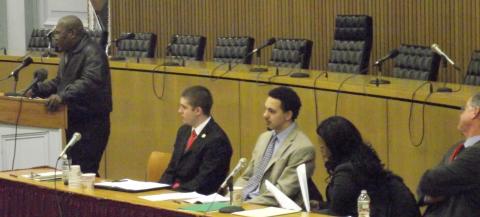
Public College Campaign Calls on State Legislators for Investment
BOSTON/State House - Calling on state legislators to reinvest in the Bay State’s public colleges and universities, students, faculty, and staff held an advocacy day at the State House on Wednesday.
Over 500 people packed the Gardner Auditorium to hear a union representative, and several students who shared their experiences of attending public institutions.
The event was organized by the Campaign for a Debt-Free Future, a Jobs with Justice initiative, and called for an increase in funding for public higher education through the continuance of Governor Deval Patrick’s 50:50 budget proposal.
Referring to the young people in the audience, Joe LeBlanc, president of the Massachusetts Community College Council (the division of the Massachusetts Teachers Association that represents community college faculty) and chair of the MTA's Higher Education Council, said “students who work hard and try from K through 12: you deserve world class public colleges and universities.”
According to a prepared press statement by the campaign, the Governor’s proposal passed in 2013, “marked a significant increase in financial aid, and the beginning of a long-term re-investment in higher education.
“A continuation means appropriating an additional $40 million to the UMass system, $20 million to community colleges, $15 million to state universities and $9 million to the Mass State Scholarship,” it continues.
LeBlanc thanked legislators for previous increases to public education funding, but pointed out that taking inflation into account, this funding has decline over time.
He said, “we’re here to urge our allies in the State House to recommit to actually investing in our public higher education campuses now and in the future; I heard a two-year pledge, that’s not enough, I want a 25-year pledge.
“As a proud member of the MTA, I see a future where our colleges and universities are in a world where affordability and quality are not competing interests, holding down cost cannot come at the expense of the quality of the experience that all of you in this room receive,” he continued.
A Worcester State University student of criminal justice, Cameron Pramas, told the audience that “we’re some of the Commonwealth’s most valuable assets, we are the future graduates, and more importantly, we’re the future workforce.”
He said that his long-term goal is to become a state trooper, but that “having a twin brother also interested in pursuing a college degree made it difficult financially for my family,” but considering the costs of private schools, he says going to a public school was a “no-brainer.”
Referring to public college students, he said that “investing in us is the way to go,” and that “80 per cent of us that graduate from public institutions will remain here in Massachusetts to work; today we send the message that investing in us makes sense.”
A Bristol Community College student, Steve Fanus, told the audience, “if you have ever wondered what a miracle looked like, take a good look, because you are looking at one right now.”
He explained that he was illiterate until he came to the US, where he was able to attend an adult literacy class at the college, and now he is a communications degree student thanks to the “quality education” he received there.
“They opened my eyes to a world of possibilities I on my own had never seen,” he says of his instructors.
Referring to an MTA report called Reverse the Course, “the analysis pointed out reliant community colleges have become on adjuncts, part-time instructors, yet how poorly these members of our higher education community in my union, in our union, are treated,” said LeBlanc.
He pointed out to the audience that “nearly two-thirds of the courses at your local community colleges are taught by adjuncts … they receive, of course, low pay, no health insurance – no health insurance – and they do not have a real retirement plan … they simply have to work until they drop.
“This problem like others we face can only be solved by meaningful long-term investing in our higher education campuses,” he continued, calling for a broad coalition of educators and students to push for the lowering of entrance fees, for an increase in full-time faculty and staff, and to “end the exploitation on adjuncts.”
The campaign was also advocating for “a continuation of a tuition and fees freeze for the UMass system … an increase of $40 million for the UMass system, $20 million for Community Colleges, and $15 million for State Universities … $9 million for the Mass State Scholarship Program, which funds the Mass Grant program that provides educational opportunities for students in need.”

